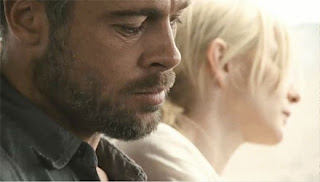I enjoyed this book, in a sinister way. That a woman could be so deranged as to kill her own mother...I couldn't decide whether to admire her or despise her. For one, she honestly believed she was doing her mother and herself a favour by terminating her one remaining parent. However, she seems mentally disturbed.
In the end, I decided that Helen was suffering from the afflictions that her parents suffered. Mental illness had taken over her and she was no longer rational. I didn't feel sorry for her, however. She was responsible for her own actions, regardless of her health.
In an era where mental illness (depression, anxiety, phobias) is rife, why does Sebold have to feed on society's misunderstandings and stigmata of the mentally ill? This novel just adds to the problems surrounding the understanding of mental illness. Not everybody who suffers ill health makes drastic choices, like suicide and murder! Why couldn't Helen be redeemed in the end - for I don't think she is.
What I like about the novel is the building of suspense. However, the anti-climax in the final third of the book is disappointing. I expected greater things to happen, but Helen just proves herself a bad person: a bad daughter and a bad mother.
Maybe I am wrong. Maybe I read this book without the grain of salt that it needs. Perhaps I misunderstood the ending, for it is ambiguous. But overall, I dislike Helen and I dislike the message that this novel presents about mental health.
I also think that there is too much in this novel. Sebold attempts to tackle different relationships as well as the underlying theme of murder and betrayal. Sebold presents many relationships: husband, daughter 1 and daughter 2 (for both relationships are vastly different), friend, mother and father. I felt that none of these relationships was given enough detail, except, perhaps, that between Helen and her friend Natalie. Helen betrays Natalie, and Natalie flees, which, IMO is slightly overexaggerated.
Anyway, here are some questions about the novel:
- Does Helen suffer from a mental illness? Or is her behaviour a result of issues that arose as she grew up with her parents and their illnesses?
- Did Clare deserve to die? Did Helen do her a favour by ending her life the way she did?
- Can you forgive, or understand Helen's motives for murdering her mother?
- What are some of the main problems that Helen encountered as she grew up in her parents' home?
- Is Helen a bad mother? Give examples. Also, what do her daughters think of her?
- What is the relevance of Helen's relationship with her ex-husband?
- What is the significance of Helen's career as a nude model? Is her job symbolic of anything (ie stripping and shedding of herself?)
- If you were Natalie, how would you react to Helen's behaviour? Eg Helen having sex with Hamish; Helen killing her mother.
- Did you enjoy the novel? What did you think of the ending (eg what happens, is Helen redeemed, justified or punished?)
